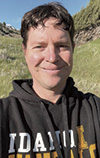The first phase of construction of the University of Idaho-led Idaho Center for Agriculture, Food and the Environment (Idaho CAFE) – comprising rough grading of open-lot corrals and dairy lagoons and construction of a 60-cow rotary milking parlor – is on pace to be completed by late September or early October.
Work on additional construction phases to add facilities and amenities needed to run a modern Idaho dairy will soon commence, and the facility is scheduled to be commissioned by early 2026.
Construction of phase two should begin in early fall and will include additional site work and the addition of a commodity barn, a calving and research barn, and an office building with classroom space.
Idaho CAFE, which will be located on 640 acres of university-owned farmland north of Rupert, will include the nation’s largest research dairy and an associated demonstration farm where the intersections of animal and crop agriculture will be studied. Pete Jones, who began working as Idaho CAFE project manager on June 26 and previously managed a 15,000-cow dairy in Burley, explained the dairy will include state-of-the-art designs and technology and will be representative of Idaho dairies.

“Almost all new barns being built in Idaho are rotary barns, and that’s what we’re building,” Jones says. “Most dairies in Idaho have covered commodity storage facilities, and we’re going to have a similar feed center. Long-term plans are to build a cross-ventilated, freestall barn, and that’s where the industry has settled on today as best practices.”
The dairy will open with about 400 cows and will eventually have the capacity to house as many as 2,000 cows. Pens, shades and manure management will also be added in a future phase, partially through the University of Idaho’s partnership with the USDA’s Agricultural Research Service (ARS) and funding that Rep. Mike Simpson (R-Idaho) was successful in directing toward the project.
Jones assisted in writing the feasibility study for the project in 2017 and is working on a business plan for its operations. He’s also exploring a few options to provide staffing for the dairy. Jones said Idaho CAFE may be able to access workers with TN nonimmigrant classification – a special economic and trade relationship created under the North American Free Trade Agreement (NAFTA), permitting qualified Canadian and Mexican citizens to temporarily enter the U.S. for work.
The center will be a leader in addressing constraints on water usage and environmental quality while supporting the agricultural sectors of dairy, livestock and cropland, as well as the food processing industries. Research at Idaho CAFE will cover these areas and more: agricultural economics impact; sustainability and labor management; agriculture commodity risk management; animal health, productivity and genetic improvement; food safety; food science and manufacturing; forage cropping and agronomy; green energy production and energy-use conservation; nutrient and wastewater management; odor and emissions control; precision agriculture and technology; production management; soil health and fertility; value-added products; and water use and protection.

.jpg?t=1727168581&width=1080)






